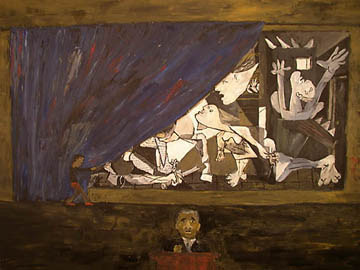 |
| Guernica after the bombing. |
In
consideration of President Trumps recent
attacks on Syria, the on-going depredations of the Israelis against the civilian population of Gaza, the proxy war against Yemen, and saber rattling this week by the U.S. and France against Iran, it
is time to recall again one of the first mass bombings of a civilian population center with little or no military significance in
history. German and Italian war
planes bombed the market town of
Guernica, a Basque village in northern Spain
on April 26, 1937. The atrocity, an episode of the Spanish Civil
War which was a dress rehearsal for
World War II, outraged world opinion at the time.
 |
| The dead in Guernica. |
Within
weeks Spanish expatriate painter Pablo
Picasso in Paris was commissioned by the Republican Government for a display at the Exposition Internationale des Arts et Techniques dans la Vie Moderne at
the 1937 World’s Fair in The City of Light. Picasso’s huge, dramatic monochromatic black, gray and white painting became
an international sensation and anti-fascist icon. It toured
the world and survived the Blitz in
London.
When
the United Nations opened its new headquarters in New York City, a full-size tapestry
reproduction was hung on a wall outside the entrance to the Security Council Chambers to remind the delegates and diplomats that their mission was to make a world where
atrocities like Guernica are impossible.
 |
| Pablo Picasso's Guernica perhaps the most important painting of the 20th Century and certainly the most representative of that blood drenched age. |
On
February 4, 2003 United States Secretary
of State Colin Powell addressed the Security Council laying out America’s case for going to war against Iraq. A
press conference followed outside
the chambers. When reporters assembled they found the famous Guernica tapestry covered by blue curtains. Officially
the United Nations claimed it was in preparation for painting and renovation. Some reporters were told that TV news crews had complained that the stark images distracted from the speakers in front of them.
No
one honestly believed either story. The picture had been masked to avoid embarrassing
Powell and the Bush Administration
which was preparing to launch their announced campaign of shock and awe
which would include bombing Baghdad
and inevitably cause civilian casualties.
 |
| Painting representing Guernica being covered for Colin Powell's United Nations press conference. |
That
is the moment that New York born poet
Gregg Mosson captured in his piece A World Without Picasso’s Guernica
which was included in the 2007 anthology
Poems
Against War: Bending Toward Justice.
Mosson
was a former reporter and commentator whose work has appeared In The
Cincinnati Review, The Baltimore Sun, The
Oregonian, The Baltimore Review, and The
Futurist. His poetry has appeared in many small-press journals. He earned his MA from the Johns Hopkins Writing Seminars, where
he was a teaching fellow and lecturer. He has authored two books of
poetry, Season of Flowers and Dust in 2007 and Questions of Fire in
2009. Mosson currently was a contributing poetry editor at The Baltimore Review.
 |
| The Poems Against the War anthology in which Mosson's poem appeared. |
A World Without
Picasso’s Guernica
February 5, 2003
At
the United Nations, blue drapes sheath
a
tapestry rendition of Guernica, so speakers can paint
blitzkrieging
dreams, burying screams affixed and aired;
killing
machines can work again.
Who
expunged Guernica from the U.N.,
and
then did U.N. walls tremor
down
to their foundation
in
the “war to end all wars”
and
covetous twentieth century?
Yesterday,
today, or tomorrow
bombs
drop and discombobulated body parts
hurl
through the air, and brown limbs
burst
from horses
and
spin past a still-standing bystander
dumbstruck
as
infernos smoke and buildings crumble.
—Gregg Mosson
 |
| Sheena Blackhall |
Scottish
poet
Sheena Blackhall captured the horror
of the bombing itself. Blackhall as born
in Aberdeen in 1947 and is a poet, novelist, short story writer, illustrator,
traditional story teller, and singer. She has written over 100 poetry pamphlets—chapbooks
we call them this side of the Pond—12
short story collections, 4 novels and 2 televised
plays for children.
Guernica
Most of the
men off fighting in Civil War
Our women and children haggling over bargains.
And then three hours bombardment from the skies
Like a place of card, our town, stamped on by giants
Those who hid in the fields were soon machine gunned.
The wooden walls of our homes, a red inferno
Wives wailed over the dead, blown up by shrapnel
Horses and bulls lay crushed by masonry.
Doves flew in all directions, panic-stricken.
I ran wildly ahead towards a bomb hole
Dived inside the churned up, muddy crater.
Bullets ricocheted, and cars exploded
Riddled corpses leaked blood on the streets
Children huddled round a parish priest
Too shocked to speak. In tatters, every one
The Plaza was a wall of living flame,
All that was left, a church, a tree, a factory
Charred bodies will forever haunt my dreams.
And this was how war came to Guernica
Our women and children haggling over bargains.
And then three hours bombardment from the skies
Like a place of card, our town, stamped on by giants
Those who hid in the fields were soon machine gunned.
The wooden walls of our homes, a red inferno
Wives wailed over the dead, blown up by shrapnel
Horses and bulls lay crushed by masonry.
Doves flew in all directions, panic-stricken.
I ran wildly ahead towards a bomb hole
Dived inside the churned up, muddy crater.
Bullets ricocheted, and cars exploded
Riddled corpses leaked blood on the streets
Children huddled round a parish priest
Too shocked to speak. In tatters, every one
The Plaza was a wall of living flame,
All that was left, a church, a tree, a factory
Charred bodies will forever haunt my dreams.
And this was how war came to Guernica
—Sheena Blackhall
No comments:
Post a Comment